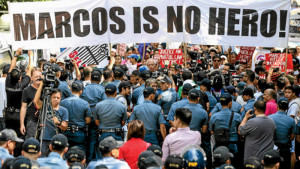After conducting only one hearing on Wednesday, the Senate committee on public information and mass media approved a measure that would exempt journalists, not only in print, but also in broadcast and online media, from revealing their sources.
Senator Grace Poe, chair of the committee, presided over the hearing that lasted for only about less than half an hour.
“First and last (hearing), approved kaagad (right away),” Poe told reporters after the hearing, noting that all resource persons present were in agreement that it was high time to amend the 70-year-old law, Republic Act 53 known as “An Act to Exempt the Publisher, Editor or Reporter of Any Publication from Revealing the Source of Published News or Information Obtained in Confidence.”
She was referring to two measures, Senate Bill No. 6 filed by Senate Majority Leader Vicente “Tito” Sotto III and Senate Bill 486 by Senate No. 486 initiated by Senator Antonio “Sonny” Trillanes IV, which both sought to amend the law to expand its coverage by including the broadcast and online media.
Poe said the proposed bills seek to protect broadcast, radio, and online journalists from divulging their sources, except for certain instances.
“Napapanahon na itong batas na ito to protect the sources of media. Ang nakalagay kasi sa batas noong 1946 pa, print pa lang. E ngayon meron na tayong radio, may television, meron pa tayong internet o online sources,” she said.
“Lalo na ngayon ang daming mga nangayayari sa ating bansa. Gusto naman nating protektahan yung mga nagbibigay ng impormasyon sa media na hindi sila matatakot na mabubuko sila lalong-lalo na kung ang gagawin nila ay makakatulong sa testimonya o sa pagbalangkas ng batas,” the senator further explained.
(This bill to protect the sources of media is timely. What is stated in the law in 1946 only covers print. Now, we have radio, television, and even internet or online sources.
Especially nowadays when so much is happening in the country. We only want to protect those who give information to media so they won’t be afraid, especially if what they are about to divulge would aid testimony or legislation.)
Poe said a similar measure had already been approved in the House of Representatives.
Sotto, in a separate interview, noted that many were not aware that the broadcast media such as TV and radio, were not still covered by the law.
“So this time, we’re covering the entire spectrum of news and journalism. We will just be very careful in the issue of social media, dapat legitimate social media practitioners and to be considered legitimate, you must be a registered company…” he said.
“But if you’re simply nagba-blog ka lang, tapos naninira ka ng kapwa o nag iimbento ka (a blogger and you lambaste someone or make things up), you’re not covered. You probably are covered by the Freedom of Expression but that’s about it. If government asks you who your source is, you have to reveal your source,” Sotto added. CDG


